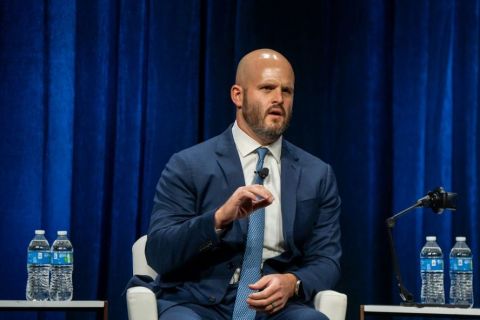Presented by:
It is amazing how quickly turbulent times can move a topic from being unpopular to generating widespread interest. With the exception of renewables and decarbonization, energy policy has certainly traditionally been the former. For years, many (including myself) have tried to talk up the role U.S. natural gas could play in reducing greenhouse-gas emissions globally, enhancing our ability to support our allies in Europe and lifting nations out of energy poverty.
Despite best efforts, the talk largely fell on deaf ears. Today, however, politicians can’t get enough of energy policy. Over the past month, elected officials who normally are not very supportive of domestic petroleum, or even hostile to it, have suddenly become big fans of U.S. natural gas in the form of LNG exports. It is a fascinating development, considering that just a year ago these same individuals would have rolled their eyes or stared off into space at the mention of LNG.
However, the war in Ukraine has now made embracing U.S. energy policy, and LNG exports in particular, a necessary and patriotic duty. The issue is that exploring, producing and transporting the natural gas needed for LNG exports is still unpopular, and public policies are being implemented that make it harder to export U.S. natural gas, not easier. Specifically, some of the same politicians who see LNG exports to Europe as an imperative still do not support development of oil and gas resources on federal lands, still oppose hydraulic fracturing, still want to stop pipelines from being built and still want to slow down permitting. They remain unwilling or unable to see the relationship between such policies and our ability to export natural gas to our allies.
Despite that dichotomy that remains, the European energy crisis and the war in Ukraine have created a window of opportunity for the domestic U.S. energy industry. Never has support for U.S. LNG exports been greater or more clearly seen as our patriotic duty. Just the same, never has demand been greater.
Watch Jack Belcher in the latest installment of Energy Policy Watch, a partnership between Hart Energy and Cornerstone.
Subscribe to receive notifications about new Energy Policy Watch episodes.
Representatives from eastern European nations including Latvia, the Czech Republic, Estonia, the Slovak Republic and Romania are making treks to the U.S. to address officials and energy companies alike in an effort to secure U.S. LNG to meet their energy needs back home. This month in Washington, D.C., more of this sentiment is likely to be heard at the European-American Energy Security and Trade Summit. With such support and demand, it is now critical that we educate members of Congress, the administration, the press and the public about the entire energy value chain and the need for sound policies that enable it to function properly.
The role of sustainability is another critical component of this opportunity. The ESG movement is in full swing, and while the outright rejection of fossil fuels by some institutions might be on hold, demands for lower carbon, highly sustainable natural gas and petroleum products will continue as shareholders, boards and employees remain focused on decarbonization and ESG performance goals. This is fueling the growth of lower carbon products such as responsibly sourced gas and other products that Europe will require under their policies and looming carbon border adjustment tax.
At the same time, the U.S. Securities and Exchange Commission’s proposed rule released in April will ultimately result in mandatory disclosure of climate-related data, such as greenhouse-gas emissions, by publicly traded companies. For larger companies, such reporting will extend to the emissions generated by their vendors, suppliers and customers. In the oil and gas industry, it means everyone doing business with those companies will eventually need to know their own emissions and put forth a plan to lower them.
Today, high commodity prices are enabling greater investment in fossil energy activities. It is also attracting some institutional investors who had previously abandoned the sector to return to the fold. Fossil fuels, and natural gas in particular, are recognized by some as a necessary evil and by others as a liberator. Perhaps we are approaching a time where global energy security and sustainability goals can merge. With a little push from allies overseas, hopefully our leaders in Washington can recognize this and support policies and regulations that allow the entire value chain to function properly. Perhaps then, we can provide society with the three things they desire from energy: affordability, reliability and sustainability. Let’s hope this opportunity is not here today and gone tomorrow.
Recommended Reading
Patterson-UTI Braces for Activity ‘Pause’ After E&P Consolidations
2024-02-19 - Patterson-UTI saw net income rebound from 2022 and CEO Andy Hendricks says the company is well positioned following a wave of E&P consolidations that may slow activity.
Oil and Gas Chain Reaction: E&P M&A Begets OFS Consolidation
2024-04-26 - Record-breaking E&P consolidation is rippling into oilfield services, with much more M&A on the way.
ProPetro Reports Material Weakness in Financial Reporting Controls
2024-03-14 - ProPetro identified a material weakness in internal controls over financial reporting, the oilfield services firm said in a filing.
Baker Hughes Awarded Saudi Pipeline Technology Contract
2024-04-23 - Baker Hughes will supply centrifugal compressors for Saudi Arabia’s new pipeline system, which aims to increase gas distribution across the kingdom and reduce carbon emissions
E&P Earnings Season Proves Up Stronger Efficiencies, Profits
2024-04-04 - The 2024 outlook for E&Ps largely surprises to the upside with conservative budgets and steady volumes.







